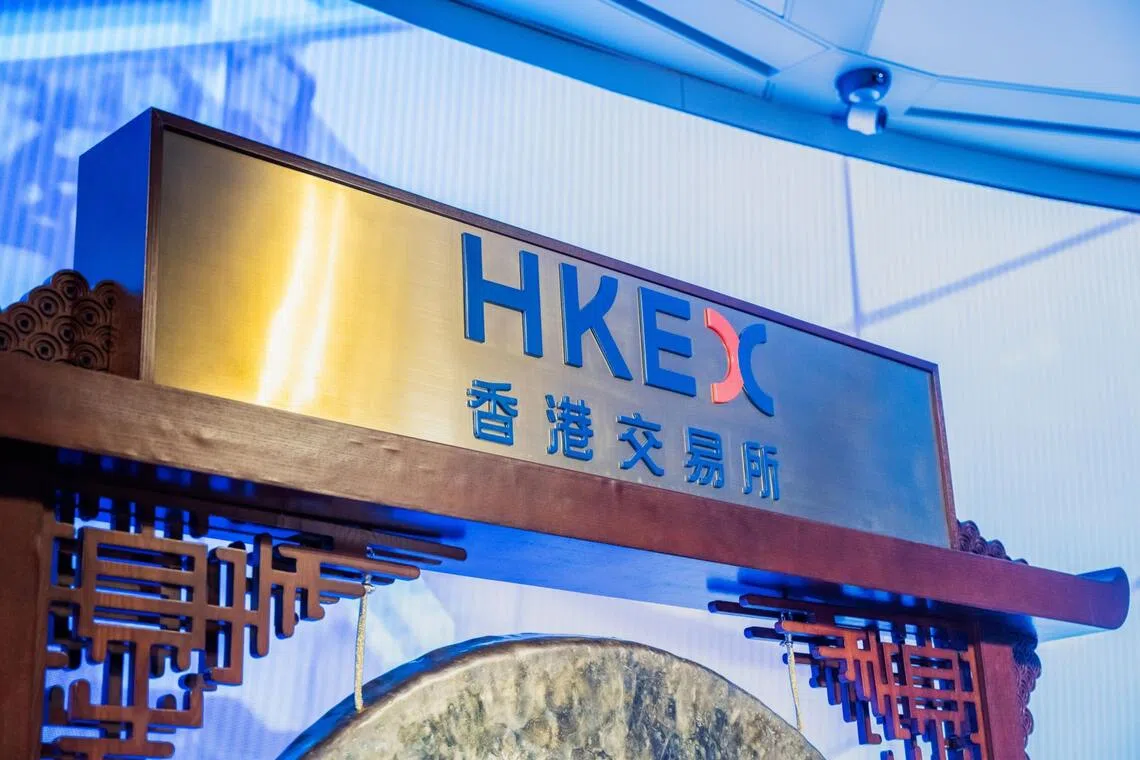HK, India, Australia bourses frown on firms that hoard crypto
Sign up now: Get ST's newsletters delivered to your inbox

HKEX has challenged the plans of at least five firms seeking to pivot to holding digital assets as their core business in recent months.
PHOTO: BLOOMBERG
Follow topic:
TOKYO – Three of Asia-Pacific’s biggest stock exchanges are pushing back against crypto hoarding vehicles masquerading as listed companies.
DAT stands for Digital Asset Treasury, which refers to publicly traded companies that hold a significant amount of digital assets like Bitcoin as a core part of their business strategy. These companies allow investors to gain indirect exposure to digital assets by buying shares, bypassing the need for self-custody and managing wallets.
Hong Kong Exchanges & Clearing (HKEX) has challenged the plans of at least five firms seeking to pivot to DAT as their core business in recent months, citing rules that prohibit large liquid holdings, according to people familiar with the plans. As yet, none of those firms has been given the green light.
So-called DATs have met with similar opposition in India and Australia.
The resistance comes with both cryptocurrencies and the listed vehicles focused on accumulating them under growing pressure, putting at risk a digital-asset rally that has prevailed for most of 2025.
Bitcoin hit a record US$126,251 on Oct 6 and is up 18 per cent year to date, a surge fuelled in large part by an explosion of companies dedicated to stockpiling the token. The model pioneered by Mr Michael Saylor’s US$70 billion (S$91 billion) Bitcoin giant Strategy has given rise to hundreds of imitators globally. They have mostly boasted valuations greater than those of their crypto holdings, underscoring strong investor demand.
More recently, DATs’ purchases have slowed and their share prices have sagged, coinciding with a sharp sell-off in wider crypto markets. Retail investors have lost an estimated US$17 billion piling into DAT trades, according to a recent report from Singapore-based 10X Research.
In Asia-Pacific markets, exchange operators’ reservations threaten to grind the plans of crypto hoarders to a halt entirely.
Cash companies
In Hong Kong, if a publicly traded firm’s assets are made up primarily of cash or short-term investments, it will be considered a “cash company” and may have its shares suspended, according to the exchange’s rules. The goal is to deter shell companies from effectively bartering their listed status for money.
For would-be crypto accumulators, success in getting approval depends on whether they can “demonstrate that acquiring crypto assets is part and parcel of their operating business”, said Mr Simon Hawkins, a partner at law firm Latham & Watkins.
Transitioning into a pure-play crypto accumulator is currently forbidden for listed firms in Hong Kong, said people familiar with the matter.
An HKEX spokesperson declined to comment on the individual firms whose plans it has challenged, but said its framework “ensures that the businesses and operations of all applicants seeking to list, as well as those already listed, are viable and sustainable, and of substance”.
In a similar episode, the Bombay Stock Exchange in September rejected an application from Jetking Infotrain to list shares from a preferential allotment. The company, which said it would invest some proceeds in crypto, is appealing the decision, a filing shows.
In Australia, ASX bars listed firms from holding 50 per cent or more of their balance sheets in cash or cash-like assets.
The clause makes it “essentially impossible” to adopt a crypto treasury model, said Locate Technologies chief executive officer (CEO) Steve Orenstein. The software firm-turned-Bitcoin buyer is currently shifting its listing from Australia to New Zealand, whose NZX is open to hosting DATs, according to a spokesperson.
ASX-listed firms that pivot to investing in Bitcoin or Ether “are encouraged to consider structuring their offering as an exchange traded fund”, a spokesperson for the bourse said. Otherwise, they are “unlikely to be considered suitable for admission to the official list”.
Japan’s hoarders
Japan is a significant outlier in the Asia-Pacific region. There, it is common for public companies to sit on large piles of cash, and listing rules allow DATs a relatively free rein.
“Once a company is listed, if it makes appropriate disclosures – for example, disclosing that it is purchasing Bitcoin – it would be quite difficult to immediately conclude that such actions are unacceptable,” said Japan Exchange Group CEO Hiromi Yamaji on Sept 26.
The nation is home to 14 listed Bitcoin buyers, the most in Asia, according to BitcoinTreasuries.net. Among them is hotelier Metaplanet, an early adopter of the DAT model that now sits on a US$3.3 billion cache of Bitcoin. From early 2024, when it began its pivot, the company’s shares ballooned to a mid-June peak of 1,930 yen. They have since fallen more than 70 per cent.
Japan has produced some of the more outlandish Bitcoin-buying plans. Convano, a Tokyo-listed operator of nail salons, in August announced plans to raise about 434 billion yen (S$3.7 billion) to acquire 21,000 bitcoins. At the time, its market value was a fraction of that sum.
Yet even for Japan’s hoarders, there are signs of friction.
MSCI, one of the world’s largest index providers, recently proposed excluding large DATs from its global indexes following an inquiry triggered by Metaplanet’s US$1.4 billion international equity sale in September. Metaplanet, which joined the MSCI Japan Small Cap gauge in February, said it would use most of the proceeds to buy Bitcoin, and has since purchased an additional 10,687 tokens.
DATs “may exhibit characteristics similar to investment funds” which are ineligible for MSCI indexes, the company said. MSCI has suggested a ban on firms whose crypto holdings represent 50 per cent or more of their total assets.
Exclusion would mean DATs no longer enjoy passive inflows from funds that track the indexes, Japan equity analyst Travis Lundy wrote in a note on Smartkarma. “That could kill the premium to book argument,” he added. BLOOMBERG

